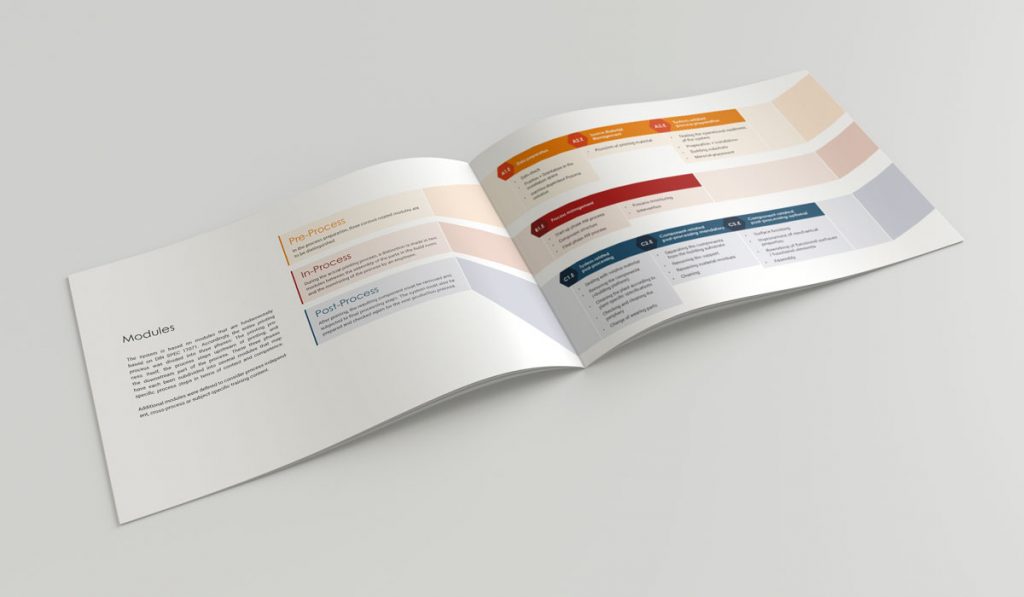
AM Training System
Modular design of a further education structure in the field of Additive Manufacturing

The production process is basically divided into three sections in accordance with DIN Spec: Pre-processing, the printing process (in-process) and post-processing.
Pre-Process Modules
In the process preparation, three content-related modules are to be distinguished:
In-Process Modules
During the actual printing process, a distinction is made in two modules between the assembly of the parts in the build room and the monitoring of the process by an employee.
Post-Process Modules
After printing, the resulting component must be removed and subjected to final processing steps. The system must also be prepared and checked again for the next production process.
Cross-Process Modules
Regardless of the position of one's own role in the process, there are topics that fundamentally affect all employees. In a manufacturing company, for example, this is quality management, i.e., the handling of information and processes, both internally and in coordination with clients. Legal aspects such as occupational safety also play a major role.
Overview
The participants will receive an overview of the AM technologies available on the market and the materials used. In addition, the process chain will be explained and the quite necessary or possible adaptations of the design to achieve optimal results of the AM component to be manufactured will be shown.
Job profiles
The system is geared to specific work activities in the AM environment. For this purpose, typical job profiles have been defined, such as the AM operator, who can also be referred to as a machine operator.
Buyer
All machine-related modules are fundamentally relevant for him, both the preparation and the post-processing, as well as the monitoring of the process.
Depending on the processes in the company, individual modules, such as the optional component-related post-processing C3.E, can of course be omitted if this is not being carried out by the AM operator. Module A1.E is also not intended for the AM operator, as it deals with the planning phase.
This catalog describes all modules that have been developed so far. It shows the contents, as well as the competencies to be learned in the module.
About AM Training System
Additive manufacturing is becoming increasingly important in industry: growth rates of up to 20% per year highlight the enormous potential of the technology, which is competing with conventional manufacturing techniques in more and more applications.
Significantly faster implementation times and enormous freedom in design are the main advantages.
To make Additive Manufacturing an integral part of industrial manufacturing and to lead it into new industries for application, the network Mobility goes Additive was founded in 2016.
This international network now includes more than 130 companies and tackles challenges in order to give 3D printing a boost in the industry sector.
One of the greater challenges is the education and training of the workforce. Machine operators must learn how to handle the printers’ special features for producing components that meet the high requirements.
Designers should learn to consider the additional benefits of additive manufacturing as early as in the development process to promote the technology out of the niche of spare parts business or the reworking of existing components.
For this purpose, numerous market participants offer further education and training on various topics.
The search for appropriate offers is time-consuming and the offers are difficult or even impossible to compare. This is due on the one hand to often superficial descriptions of the training content, and on the other hand to the high degree of individuality of the offerings, which are to be developed for customers depending on their needs and prior knowledge.
MGA has recognized these issues and wants to help make the training landscape more transparent. This will support companies, venturing into the field of additive manufacturing, get started and provide guidance in choosing appropriate training.
Based on this motivation, the networks working group “Education” has developed a modular training system that is designed to meet the different requirements of workplaces.
The system defines content and competencies that are required when dealing with additive manufacturing in specific professions and thus provides a reference point for better comparability of training offers. At the same time, it must be kept general enough to give training providers freedom in designing courses to take account of specific customer requirements.
The concept was developed based on the experience of various industry participants from all parts of the process chain, together with training providers and certification bodies. It is basically based on the process diagram of DIN Spec 17071.

